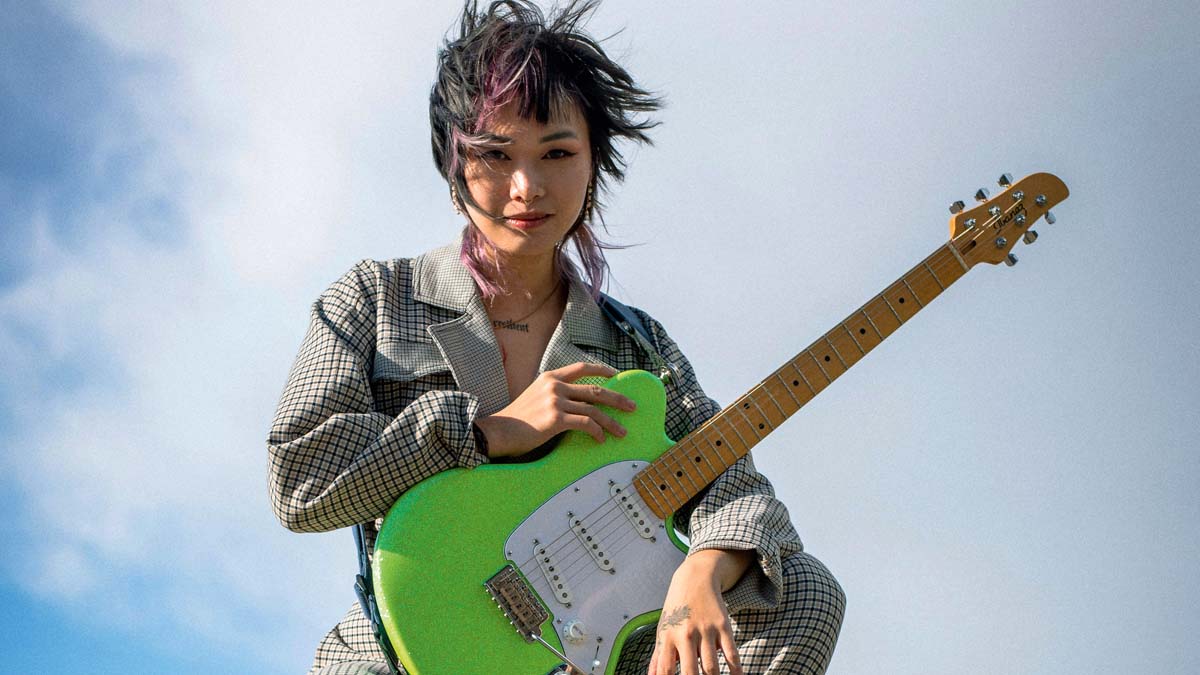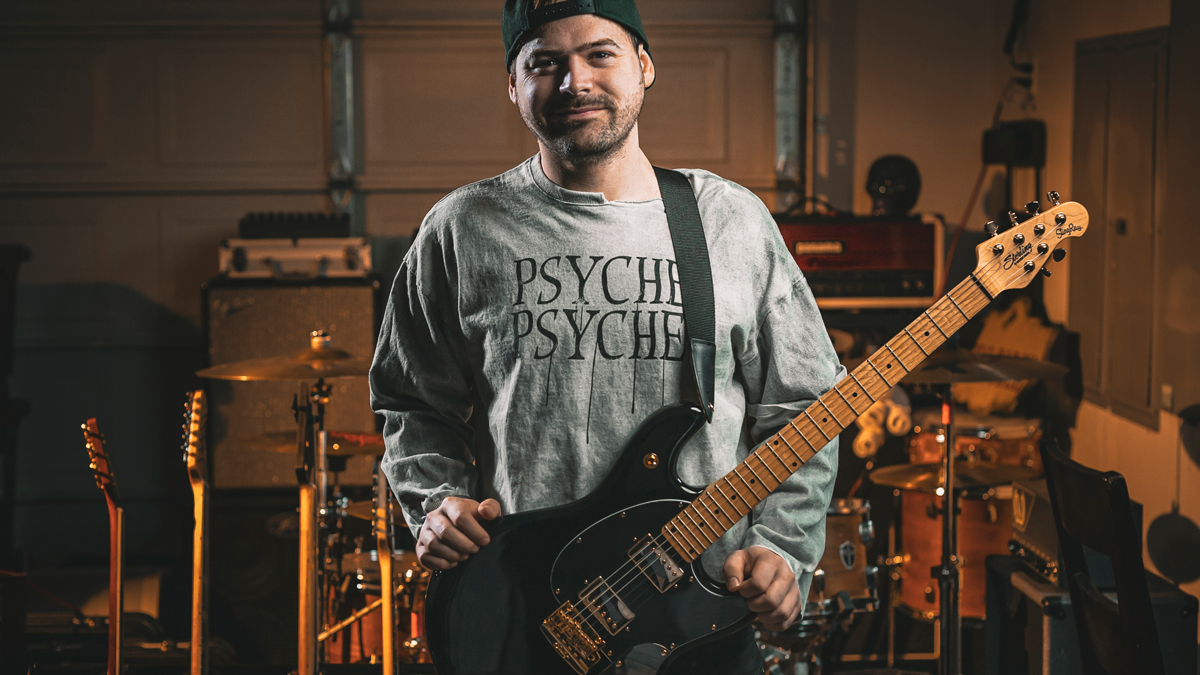Why comparing yourself to other guitarists is bad news for your playing, creativity and mental health
Social media can dent your confidence on the instrument – here’s how you can take action

Best of 2021: For all the horrors of the pandemic, one of the silver linings has been a surge in collaboration. We’ve seen lockdown collabs between some of the biggest names in guitar – from Eric Johnson to Brian May – and a host of phenomenal all-star shred videos.
A few months back, I was asked to take part in one of these solo jams. And I was pretty pleased with the lead I put together. It had a few flashy moments and, at least to my ears, it felt like my note choices told a story over the backing track provided.
I braced myself for the fact that my 20-second clip would be sandwiched between some ridiculously talented players. But when the video dropped, some all-too-familiar negative feelings reared their head nonetheless: that sensation of inadequacy, of having failed to live up to some intangible standard.
My musician friends told me it was good. Other players in the video told me they dug it. The guitarist who organized the collaboration said he was impressed. So why did I feel so despondent?
It’s a sinking feeling many musicians are familiar with. And, of course, it’s far from a new phenomenon. When Eric Clapton invited Jimi Hendrix to jam with Cream, Slowhand famously stormed offstage after the show, lit a cigarette and complained to Hendrix manager Chas Chandler, “You never told me he was that fucking good.”
Over the decades, guitarists have been perceived as sensitive creatures who hate being outshined – an insecurity that has likely fueled online hate surrounding the instrument. But the sheer volume of seemingly unsurpassable guitar playing at our fingertips can very quickly take this sense of self-doubt to new levels.
Doom-shredding

If you’re already in a negative headspace, flicking through a feed full of ‘perfect’ guitar playing can be the guitar equivalent of another pandemic phenomenon: doom-scrolling – in this case, watching endless videos of players whose ability you perceive to be superior to your own, leading to a downward spiral of six-string inadequacy.
Get The Pick Newsletter
All the latest guitar news, interviews, lessons, reviews, deals and more, direct to your inbox!
Fear of failure and pressure to succeed are among the primary drivers of negative emotions for musicians
Guitarists aren’t alone in this: a 2019 survey found that 73% of independent music-makers suffered from symptoms of mental illness, with fear of failure and pressure to succeed among the primary drivers of negative emotions – and it’s not hard to see how social media feeds into these feelings.
In fact, one of the world’s biggest guitar tutors, Justin Sandercoe (aka Justinguitar), observed that this sense of inadequacy is common even among his fellow instructors and top-tier players (and if learning a new technique is the source of your anxiety, his five-point plan for taking inspiration, rather than intimidation, from great guitarists is well worth a read).
Of course, this is where today’s wealth of guitar talent can be a huge advantage: just as we have access to all the music in the world via streaming services, we can be dazzled by any technique we can possibly imagine.
Yet rather than developing six-string FOMO, it’s important to remember that guitar is not something you can complete – and nailing every technique under the sun is not compulsory.

In fact, putting somebody else’s technical ability on too high a pedestal can lead you to feel like you’re not a ‘good’ guitarist at all. That’s why some players find it valuable to measure success in a different way – just ask Yvette Young, one of the most innovative and gifted guitarists of the modern era.
“I never really felt like I got good on guitar,” she told Total Guitar. “The way I spend my time is still very much based around improving. When I think about the term ‘good guitar’ I end up thinking about total virtuosic shredding. I admire that stuff a lot, but I can’t do a lot of the things all these monster players do.
“It’s more about getting faster at conveying what I hear in my head and translating it to the fretboard. For me, that’s when I feel like I’m good at guitar... When I can translate that vision instantaneously rather than sit around and dick around for a bunch of time!”
Socially responsible
Now, this article isn’t intended as some kind of anti-social media diatribe – after all, Instagram, YouTube and now TikTok have shone a spotlight on countless inspiring players – and nor is it intended to discourage the quest for improvement that comes from learning new techniques and new skills.
Rather, it’s a chance to assess how you perceive social media and the musicians you follow. We have an innate desire to compare ourselves to others – and on social media, that’s likely to be because we feel they are superior in some way. Yet while feelings of inadequacy can motivate you to achieve, more often than not it isn’t good for your mental health.
This is particularly salient given one of the biggest guitarists on Instagram, Mateus Asato, shut down his account this month, in part because he “got lost inside the boxes of the 15-60-[second] videos”. Asato believes this short-form format is leading guitarists to “los[e] the essence of [musical] interaction, establishing patterns based on the same four-bar chord progressions to start the vibe”.

In short, we’re all striving to impress, all the time – and it’s not a realistic goal for ourselves, or for our audiences. So, it’s worth remembering that there are ways you can take charge of confidence in your own ability.
Not every clip of mind-blowing playing took someone 30 seconds to perform and record. What social media hides is the hours, even days, of practice it took to nail that lick
For starters, remember that not every clip of mind-blowing playing took someone 30 seconds to perform and record. What social media hides is the hours, even days, of practice it took to nail that lick, and the 19 failed takes that weren’t good enough. As Asato puts it, “Instagram helped musicians to get better at business, at making flawless performance videos (after uncountable takes).”
It sounds obvious, but when you’re working on something, whether it be a technique or a new song, be patient with yourself: don’t push yourself into a negative headspace if you can’t master something right off the bat. Start slow and build up. It can take days, weeks, months, but you’ll get there.
And if you feel like spending time on socials is having a negative impact on your mindset, don’t be afraid to take a break. You may be surprised by how much your productivity and confidence in your playing improves.
The same goes if you’re panicking about the quantity of your own posts. If you yourself are trying to build momentum for your own account, you might feel like you don’t have enough time to keep up with the volume of output from those you aspire to emulate.
Even one of today’s premier guitar personalities, Jared Dines, felt the need to take a step back, after observing the toll social media was taking on his mental health.

“I got to a point where I just said ‘screw it,’” he told GW last year. “I was so worried if I don’t post this week, I’m going to be irrelevant. If you don’t tweet every day people are going to forget about you. Now, I just don’t care. I don’t give a fuck. I just found I need to do the things that I feel inspired to do and motivated to do on any given day.
“I’m stepping away from that mentality of ‘I need to post, I need to post, I need to post,’ and just chilling out a little more and calming down and just being, ‘You can relax, you can be a normal person, you can go to dinner with your girlfriend, you don’t have to constantly be on your phone.’”
And if you’re feeling terrible about your playing, one of the absolute best pieces of advice we can share comes from shred guru Angel Vivaldi, who has one simple trick to make you feel better: turn your guitar upside-down, and try playing left- (or right-) handed.
That’s how it would feel to be a complete beginner, and a reminder of how far you’ve come on the instrument. Rather than always focusing on what you’ve yet to master, take some time to show gratitude for the abilities you’ve already acquired.
You do you
Above all else, remember this: no matter what you feel on any particular day, at any individual moment, you are a guitarist. You have dedicated your time to learning an instrument that serves as a conduit for your emotions and should be a source of joy and satisfaction above all else.
The beauty of the guitar lies in its individuality… there are elements of your playing that nobody else can ever replicate
Those positive emotions come from creating, learning and improving your own ability – and that’s something you can’t enjoy if you’re too busy focusing on others’ successes, and not your own.
After all, the beauty of the guitar lies in its individuality: your vibrato is different from any other guitar player who ever lived. The combination of your pick attack and your gear means your tone is, too.
No two guitarists are alike, and while there are core fundamentals that are useful to all musicians, it’s OK to be different from the players that populate your feed.
Don’t fixate on whether there are enough notes, or whether other guitar players will be impressed. There are elements of your playing that nobody else can ever replicate.
Remember that, and invest in your uniqueness, rather than any perceived peer pressure of what you think your playing should be like – because individuality, not similarity, will always be the hallmark of any great guitarist.

Mike is Editor-in-Chief of GuitarWorld.com, in addition to being an offset fiend and recovering pedal addict. He has a master's degree in journalism from Cardiff University, and over a decade's experience writing and editing for guitar publications including MusicRadar, Total Guitar and Guitarist, as well as 20 years of recording and live experience in original and function bands. During his career, he has interviewed the likes of John Frusciante, Chris Cornell, Tom Morello, Matt Bellamy, Kirk Hammett, Jerry Cantrell, Joe Satriani, Tom DeLonge, Ed O'Brien, Polyphia, Tosin Abasi, Yvette Young and many more. In his free time, you'll find him making progressive instrumental rock under the nom de plume Maebe.
“Every tour was the best I could have done. It was only after that I would listen to more Grateful Dead and realize I hadn’t come close”: John Mayer and Bob Weir reflect on 10 years of Dead & Company – and why the Sphere forced them to reassess everything
“Last time we were here, in ’89, we played with Slash on this stage. I don't remember what we did...” Slash makes surprise appearance at former Hanoi Rocks singer Michael Monroe's show at the Whisky a Go Go


![John Mayer and Bob Weir [left] of Dead & Company photographed against a grey background. Mayer wears a blue overshirt and has his signature Silver Sky on his shoulder. Weir wears grey and a bolo tie.](https://cdn.mos.cms.futurecdn.net/C6niSAybzVCHoYcpJ8ZZgE.jpg)

![A black-and-white action shot of Sergeant Thunderhoof perform live: [from left] Mark Sayer, Dan Flitcroft, Jim Camp and Josh Gallop](https://cdn.mos.cms.futurecdn.net/am3UhJbsxAE239XRRZ8zC8.jpg)






